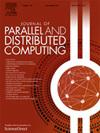SpEpistasis:检测三向外显率的稀疏方法
IF 4
3区 计算机科学
Q1 COMPUTER SCIENCE, THEORY & METHODS
引用次数: 0
摘要
外显子检测是生物信息学和生物医学领域的一项基本应用,它为了解人类基因组与某些疾病的发生之间的关系提供了重要依据。为了获得精确和确定性的解决方案,人们采用了穷举外显检测方法,但代价是计算复杂度高,尤其是在针对高阶外显时。虽然最近的研究采用了矢量化和高速缓存阻塞技术来减轻这一负担,但这些解决方案目前受到计算系统功能单元最大性能的限制。因此,要进一步提高外显检测的性能,就必须减少内存传输和计算的次数。为了解决这个问题,本研究提出了 SpEpistasis,它依靠稀疏特征进行三向表征检测,通过只存储数据集的非零元素,可以减少表征检测所需的运算量。为了实现这一目标,我们提出了一种新的混合格式来表示输入数据集,它以压缩稀疏行格式存储数据子集。此外,还提出了新的稀疏感知算法方法,以充分利用混合格式和当前英特尔、AMD 和 ARM CPU 的矢量功能。实验结果表明,与其他先进技术相比,SpEpistasis 的速度提高了 3.7 倍,平均速度提高了约 1.8 倍和 1.33 倍。本文章由计算机程序翻译,如有差异,请以英文原文为准。
SpEpistasis: A sparse approach for three-way epistasis detection
Epistasis detection is a fundamental application in the areas of bioinformatics and biomedicine, providing important insights regarding the relationship between the human genome and the occurrence of certain diseases. Exhaustive epistasis detection approaches are employed to achieve an accurate and deterministic solution, at the cost of high computational complexity, especially when targeting high-order epistasis. While recent works employ vectorization and cache-blocking techniques to alleviate this burden, these solutions are now limited by the maximum performance of the functional units of computing systems. Thus, to further improve the performance of epistasis detection it is necessary to reduce its number of memory transfers and computations. To tackle this issue, this work proposes SpEpistasis, which performs three-way epistasis detection by relying on sparse features, which by only storing the non-zero elements of the dataset, allows for reducing the number of operations needed for epistasis detection. To achieve this goal, a new hybrid format to represent the input dataset is proposed, which stores a subset of the data in the compressed sparse row format. Moreover, new sparse-aware algorithmic approaches are also proposed in order to leverage both the hybrid format and the vector capabilities of current CPUs from Intel, AMD, and ARM. The experimental results show that SpEpistasis provides a speedup up to 3.7× and average speedups of around 1.8× and 1.33× when compared with other state-of-the-art works.
求助全文
通过发布文献求助,成功后即可免费获取论文全文。
去求助
来源期刊

Journal of Parallel and Distributed Computing
工程技术-计算机:理论方法
CiteScore
10.30
自引率
2.60%
发文量
172
审稿时长
12 months
期刊介绍:
This international journal is directed to researchers, engineers, educators, managers, programmers, and users of computers who have particular interests in parallel processing and/or distributed computing.
The Journal of Parallel and Distributed Computing publishes original research papers and timely review articles on the theory, design, evaluation, and use of parallel and/or distributed computing systems. The journal also features special issues on these topics; again covering the full range from the design to the use of our targeted systems.
 求助内容:
求助内容: 应助结果提醒方式:
应助结果提醒方式:


